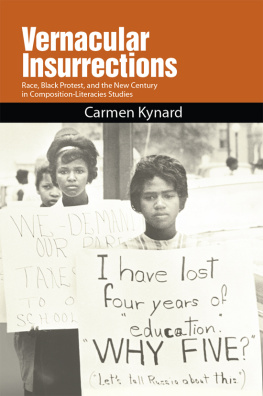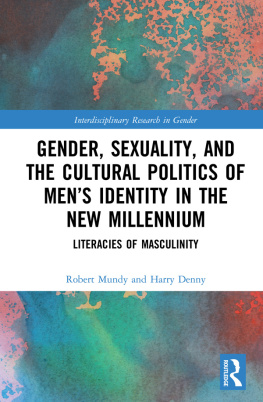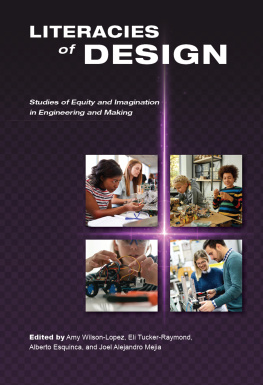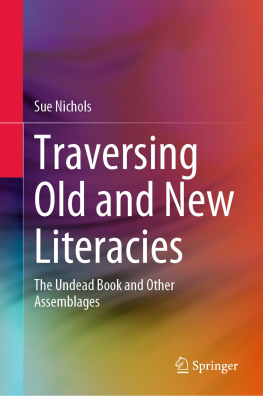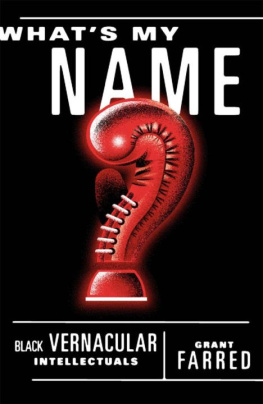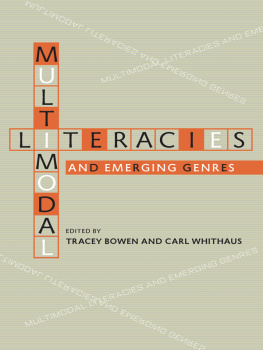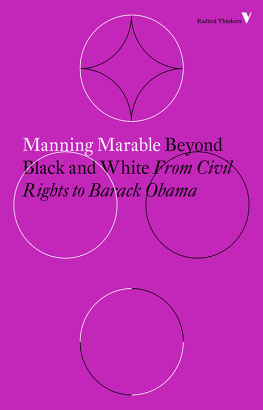Vernacular Insurrections
Race, Black Protest, and the New Century in Composition-Literacies Studies
CARMEN KYNARD

Cover image: Photo of Civil Rights protest in Farmville, July 1963. Image courtesy of Richmond Times-Dispatch.
Published by State University of New York Press, Albany
2013 State University of New York
All rights reserved
Printed in the United States of America
No part of this book may be used or reproduced in any manner whatsoever without written permission. No part of this book may be stored in a retrieval system or transmitted in any form or by any means including electronic, electrostatic, magnetic tape, mechanical, photocopying, recording, or otherwise without the prior permission in writing of the publisher.
For information, contact State University of New York Press, Albany, NY
www.sunypress.edu
Production by Eileen Nizer
Marketing by Fran Keneston
Library of Congress Cataloging-in-Publication Data
Kynard, Carmen, 1971author.
Vernacular insurrections : race, black protest, and the new century in composition-literacies studies / Carmen Kynard.
pages cm
Includes bibliographical references and index.
ISBN 978-1-4384-4635-6 (hardcover : alk. paper)
1. African AmericansEducation. 2. African AmericansSocial conditions. 3. Multicultural educationUnited States. 4. English languageRhetoricStudy and teachingUnited States. 5. English languageComposition and exercisesStudy and teachingUnited States. I. Title.
LC2717.K94 2013
371.82996073dc23
2012018794
10 9 8 7 6 5 4 3 2 1
In Memoriam
Pigeon Underwood Kynard
Sunrise February 12, 1917
Sunset January 26, 2010
Acknowledgments
It's been a long time coming on this book and so I have many thanks to give. My editor at SUNY, Beth Bouloukos, has been the kind of writing teacher we should all have: patient, supportive, and critical. I am indebted to a special cast and crew at New York University's Steinhardt School of Education and to the Founders Fellowship there under the leadership of Dean Mary Brabeck. John Mayher believed in my abilities more than I did and was the first person to encourage me to decide and define my writer's identity. Gordon Pradl always pushed me to think harder and to know my stuff and gave me mounds of books to get the job done. And of course, much love to SuperDiva Suzanne Carothers who has valued my life and well-being more than anyone. I thank all of my former teachers who let me explore and think critically: Sarah Beck, Renee Blake, Robby Cohen, Manthia Diawara, Maryann Dickar, Berenice Fischer, Brenda Greene, Perry Greene, Floyd Hammack, Robin Kelley, Ngugi wa Thiong'o, Oliver Patterson, Ira Shor, and Marcie Wolfe. Any errors here are all mine (don't hold my opinions against them). I owe much gratitude to John Rouse, who took the time out to guide me, invite me into his home, and share with me his thoughts on my rather youth-energized question: Why those folk act so crazy about that review you wrote in 1979? I also thank, with warmth and praises, Jacqueline Jones Royster, whom I was honored to have shared this project with. You have inspired my mind, heart, and soul and pushed me to see this work and myself as valuable. I thank the woman who birthed me intellectually, Sylvia Wynter. I will always be your student, always learning at your feet, always indebted to you for your example of who and what a scholar-teacher-thinker is and does.
This work would not have been possible without two special divas. Like Sister Sledge sang back in the day, I got all my sisters with me! In my case, I'm talkin bout Avon Cowell-Connell and Yolanda Sealey-Ruiz, the two flyest and most genuine girlfriends you could ever have (and Lil Olivia Diva too). Thank you to everyone who has lifted my head and heart through this process: Bob Eddy, brother and comrade who always checked in on me to make sure that I was alright and when I wasn't, assured me that I would make it; Demetrius Eudell, who was once my TA when I was only nineteen and first inspired me to see myself as an academic; Institute N.H.I. at Stanford University who always pushed to make scholarship theory, knowledge, and liberation ONE word; my homies, Rod Bowen, Kwanza Butler, and Karma Suttles, whom I moved to NYC with in order to become a teacher; Wayne Russell, Jamaican-Iron-Chef, who sustained me with soursop, sorrel, jerk chicken, sea moss, black cake, and porridge, all seasoned with his special care and support; Peter Elbow, for always having my back and being a shoulder to cry on; my old Bronx crew, Debbie Black, Eric Debarros, and Raphael Osorio, whose conversations sustained me more than anything else and got me from there to here; for the sisterhood and support of Jamie Lew, Sherri-Ann Butterfield, and Marcia Brown at Rutgers-Newark; to John Rodriguez for seeing and understanding my attempts to lyricize a classroom; to Michelle Hite, for always making me remember high standards attached to black love, beauty, and freedom; to my sistas on the set at St. John's UniversityRegina Duthely and Sammantha McCallaso glad yall are here; the first spinner to make me my own groove, and at 4Cs at that, Todd Craig; to Jessica Barros, for never giving up on the ancestors' dream for her; to a set of graduate students who are putting in the good fightMary Jo Caruso, Kathie Cheng, Amanda Grefski, Erin Fiero, Jennifer Lebowitz, Steven Netcoh, Radha Radkar, Deborah Sanchez, Jamila Smith; to the Black Caucus of NCTE/CCCC for the past, present, and future that spills out onto the pages here. I thank my first college family at Medgar Evers College in the departments of Education and English for teaching this newjack how to swing! I send much gratitude to my colleagues in the department of English and the First Year Writing program at St. John's University, especially my chair, Stephen Sicari, and program coordinator, Dorothy Bukay, for support and encouragement.
And of course, I thank that whole Noah's Ark of Kynards and all that they taught me about life and love: Grandma Pigeon, Granddaddy William, my fourteen aunts and uncles, my forty-four first cousins and counting, and fifty-plus seconds, thirds, and so forth. We need our own real reality TV show! I especially thank my parents, Ruth and Joseph, who have always cheered me on, even when I was thirteen years old contemplating being a brain surgeon, fashion designer, Sheila E, or all three at the same time.
I will always remember that one day in graduate school when I was really down and overwhelmed with work and school and life and one of my students came into my office, looked at my face, and told me: Remember, you are not just doing this for you, you are doing this for us. So to all the students who have shared their minds and hearts with mefrom East Palo Alto to South Central L.A.; from the Boogie Down Bronx, down into money-takin Manhattan and on through into Brooklyn; from Newark to Queensthis one is for all yall. May all of your classrooms someday match your infinite beauty, intellect, and literacies.
An earlier version of a story about Rakim in first appeared in Trying to Bend The Tree When It Is Already Grown: Spanning the Spectrum of African Diaspora Englishes in the Writing Classroom, in Teaching English Today: Advocating Change in the Secondary Curriculum, edited by Barrie R. C. Barell, Roberta Hammett, John S. Mayher, and Gordon M. Pradl (Teachers College Press, 2004), full chapter on pages 92105. Reprinted with permission. Cover photo represents 1963 Civil Rights Protest by students in Farmville, originally printed in the Richmond-Times Dispatch.
Next page
